A FIGUREHEAD
Used to describe someone at the top of an organisation; someone to look up to. The figurehead of a ship, usually a buxom lass fitted to the bow, who was the titular spirit or sole of a ship.
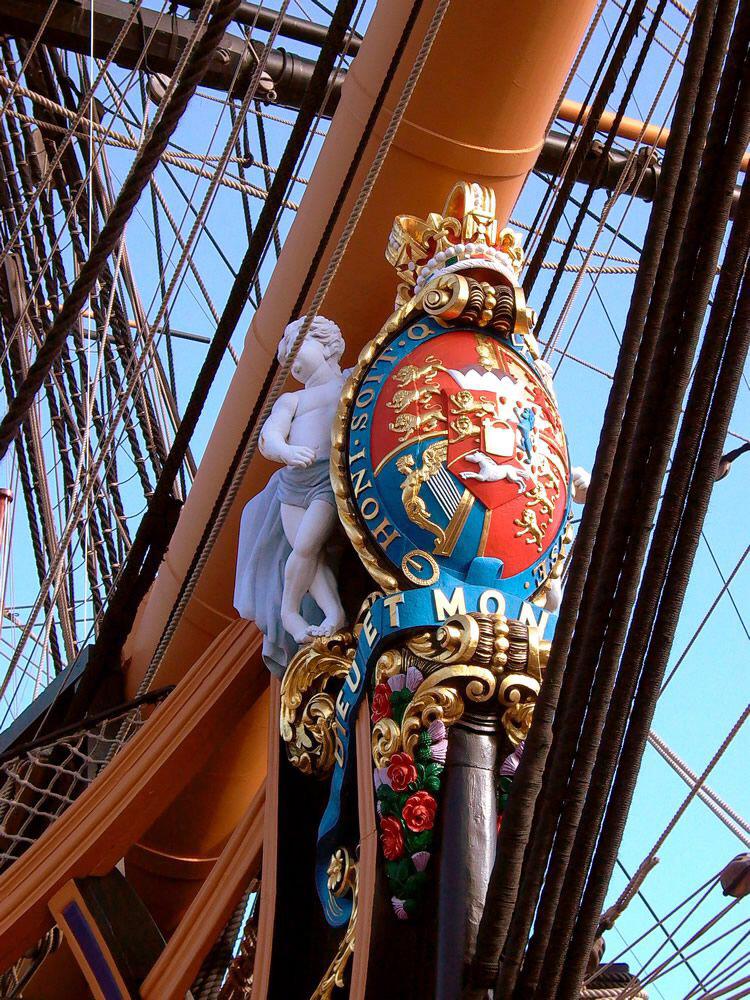
ALL ADRIFT
Taken from the rigging after a storm which may have been broken or be unattached, and hence be ‘all adrift’ and not under full control.
ALL DECKED OUT
A ship is ‘decked out’ when flying bunting as a decoration, and hence looked at its best.
ALL HANDS TO THE PUMPS
If the ship got into trouble, and began sinking everyone would ‘bail out’ the ship. Now used to describe a situation where everyone is needed to cope with a given situation.
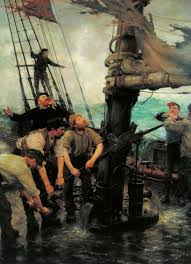
BEAR UP UNDER THE STRAIN
Another popular expression that has come ashore, is derived from when the Helmsman would steer the vessel into the wind whilst being forced over by strong gusts of wind. This would result in some of the wind being spilt from the sail, and allowing the ship to recover rather than broaching.
BINGE
The operation of emptying a rum storage cask for new contents, the rum was never thrown away, but obviously consumed. Hence, to go on a BINGE, was to get drunk.
BITTER AND TWISTED
Derived from the Bitter (end of a rope) or anchor rope, where it become twisted into a knot, and would be a difficult task to undo, or sometimes known as ‘a devil of a job’. Now come ashore to mean someone who has a rather vindictive persona.
BITTER END
‘I’ve reached the bitter end’. The inboard length of a ship’s cable, which in the case of a ship’s anchor, was secured to special strong points called BITTS. If the cable was run out all the way it was at the BITTER END, hence the popular expression for something at its limits.
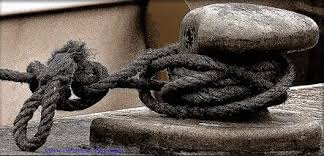
BLAZER
A smart dress jacket chosen (and supplied) by the Captain of HMS BLAZER for his crew in 1845 before the Blue jacket became standard Naval uniform. It featured a short jacket with multi-coloured vertical stripes, a feature that lives on at Henley each year, and is still associated with rowing and oarsmen.
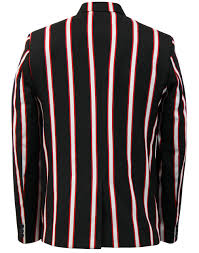
BOTTOMS’ UP!
A check of the bottom of ones tankard to see if a drink contained the Queens Shilling, this was soon checked with a glass bottomed tankard. See ‘Pressed’.
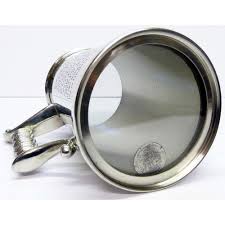
BRACING WIND
As the wind sharpened, the crew would make the sails taunt by the crew hardening the braces.
BRASS MONKEYS
Cold. Abbreviation of the phrase ‘cold enough to freeze the balls off a brass monkey’; this referred to iron cannon balls that contract in very low temperatures, then falling through their brass storage tracks (monkeys) alongside the guns, that expand when cold. So the two counter effects make the canon balls fall off. It’s the laws of physics!
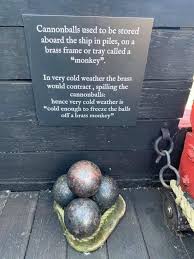
BRISTOL FASHION
Everything neat, tidy and seaman like in both appearance and function, based on the reputation of ships that used to trade out of Bristol. The full expression, which has come ashore to a wider usage, is ‘all shipshape and Bristol fashion’.
BROKE
An Officer forced to leave the Royal Naval Service. Stems from the Court-martial procedure of BREAKING that Officers sword if guilt is proven.
BUBBLY
Grog rum diluted with water. When mixed three and one with water in the rum tub, NEATERS’ rum took on a foaming appearance, and it was in this state that it was issued to the BUBBLY BOSON from each mess deck who came to collect the tot in a rum fanny when ‘Up Spirits!’ was piped.
BUSKING
Old Naval term for pirate vessels cruising along a coast looking for something to attack; now used for itinerant musicians who cruise along a queue of people, still in the hopes of finding some form of treasure.
CAN’T MAKE HEAD NOR TAIL OF IT!
Expression used by the Yeoman of the Signals when he was unable to make any sense out of a distant hoist of flag signals; this expression has come ashore into wide spread usage.
CARRY ON IN SOMEONE’S WAKE
Used to describe the action of following another vessel, and the turbulent water left behind it.
CAT O’NINE TAILS
Instrument of punishment in the Royal Navy. If the rope tails were knotted, then it became a ‘thieves’ cat. This device was stored in a red baize bag to conceal the blood drawn on it, and hence the expression ‘the cats out of the bag’ ‘ meaning that retribution or trouble was imminent.
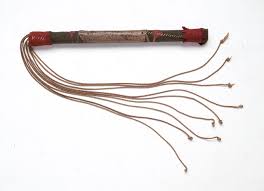
CHOCK A BLOCK (Choc ‘a’ Bloc)
This is where the sailor would deliberately or otherwise pass the fail (or tail, of the rope) into the pulley of a block and tackle thus jamming it and preventing it from moving further hence fill the block completely. Now use to describe situations that are heavily congested.
CIVIL SERVANTS
Derived from the 1600 AD East India Company to distinguish ordinary merchants from a collection of employees (Civil Servants) who were used to bear arms.
CLEAN SLATE
The helmsman’s log slate of old, on which the course to be steered and distance made would be chalked – and then wiped clean and the start of the next trick. The expression has come ashore to a wider use implying a fresh start, or when ‘wiping the slate clean’ in cancellation or settlement of a debt.
COPPER-BOTTOMED
Copper sheathing plates fitted to the wooden hulls of old; they reduced attack by the Teredo worm so that the wood lasted longer, and because barnacle and weed growth was less, it made the ship go faster. Hence the expression for guaranteed to be worthwhile as having a copper-bottomed guarantee.
CREST OF WAVE
The vessel when at the top of a wave afforded it the best visibility, and also gave the best turn of speed when moving through fast moving waters. An expression that has come to mean that one is on, or at a high point.
CUT AND RUN
To make a quick getaway rather than weigh anchor that is it took a considerable time to raise the anchor, so the Captain may ‘cut’ the anchor rope letting the ship go, and hence be able to ‘run’. If possible he would buoy the rope so that it could be retrieved on return.
DEVIL AND THE DEEP BLUE SEA/ DEVIL TO PAY
In the first expression, the Devil was the seam between deck and hull, meaning there was only the thickness of the ship’s hull planking ‘between the devil and the deep blue sea’. In the second expression, the Devil was the long plank running from stem to stern and adjacent to the keel. The caulkers who had to keep this stem waterproof by ‘paying’ it with oakum (hemp fibres unpicked from condemned rope) and then sealing with hot pitch found the procedure very difficult, since this was the wettest and most inaccessible hull area of a careened vessel. The full original expression – now known to mean in serious trouble, is the ‘Devil to pay’.
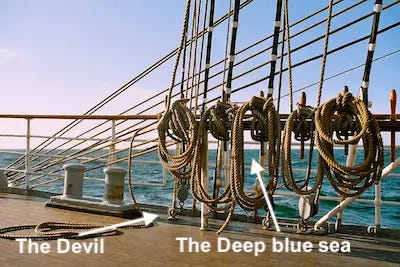
DOG TIRED
How Jack Tar felt after coming off a ‘Dog Watch’ Dog watches were two (short) two-hour periods inserted in the ship’s routine to equalise the daily roster.
DO A TURN
An expression used when doing a period on the wheel or tiller on a ship.
FAGGED OUT
Tired, from the ‘fagging out’ of an old rope’s end. Hence also the term ‘fag end’ for a frayed and stamped on cigarette butt, and the actual derivation of the word fag.
FLAKED OUT
Meaning tired or exhausted. Comes from the activity of laying out an anchor cable on deck In-order to inspect it for weak links.
GET OR GOT THE WIND UP
Simply meaning ‘when the wind came up’ to fill the sails. Typically when two ships were both becalmed, and suddenly one got the breeze, the crew of the other were known to remark ‘She’s got the wind up’. Also used to describe impending heavy weather associated with high winds and not knowing what perils these may bring. An expression that has come ashore to mean someone, who is troubled by a particular situation but has not yet happened and is creating concern.
GLORY HOLE
A name originally used for a Stoker’s quarters. Now used for any storage space which has become filled with unofficial items and hidden from view.
GOING AT A RATE OF KNOTS
Simply the speed of the Ship measured in Nm/hour but now used to imply that something is going fast, ‘it went by at a rate of knots’.
GRAPPLING WITH A PROBLEM OR SOMEONE
Once you have borne down on your Foe, you would throw grappling hooks over the side of the other vessel, so that the two ships could be tied together for boarding.
GROG/GROGGY
Rum diluted with water. When diluted in this (deliberate) way the bubbly would not keep very long, and so (in theory) could not be hoarded and consumed later, unlike NEATERS Rum, which would last. Grog was named after Admiral Vernon – nicknamed ‘Old Grogram’ after the grogram boat cloak that he wore. A night on the Grog would leave Jack Tar feeling distinctly ‘Groggy’.
HARD UP, TO BE HARD UP
Used to describe being ‘hard up’ against the wind. Sailing like this meant that no more could be got from the wind to make any head way, Also used to describe the a vessel that was docked in a ‘Hard’ which was used as a drying area, to enable work to be carried out on the Ship. Hence the ship could not be earning any money and was ‘hard up’.
HAVE A SQUARE MEAL
This expression is derived from the food plate used by sailors, which as its name describes was square in shape. The sailor was allowed to take as much food as the plate would carry, and hence the expression to have a ‘square meal’ which we know as a meal that is substantial in quantity.
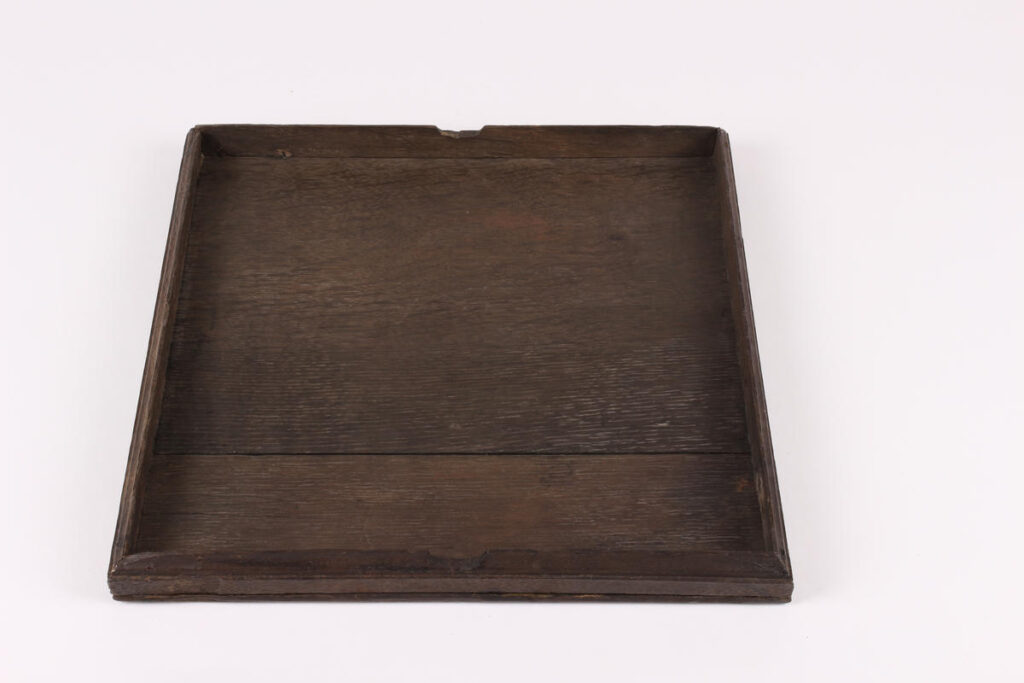
HEADS
On a ship the ‘heads’ is the bathroom/toilet and the term comes from ships usually square-rigged sailing ships, where the wind was almost always from astern. Therefore, Sailors would go to the “head” of the ship so as not to relieve themselves “into the wind”.
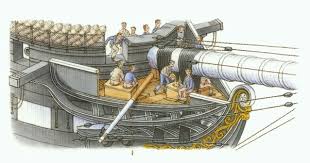
HIGH AND DRY
The expression to be left ‘high and dry’ derived from when a ship had run aground, or when the tide had gone out, leaving it ‘high and dry’, so the ship could not go anywhere.
HOLD FAST
An expression that now means to stop what you are doing. Derived from the task of holding the rope around the cleat to stop it paying (moving) out any further.
I’LL BE A MONKEYS UNCLE
The ‘powder monkeys’ were small boys who used to carry the shot and powder from the ships magazine to the guns. These boys were often of parentage unknown; the crew having visited many a port, the expression was coined by the crew to mean in some way ‘loco parentis’, to be a relative to the young lads.
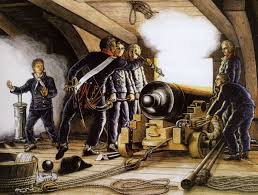
IN THE DOLDRUMS
The ‘Doldrums’ being an area of calm winds set between the ‘Trade winds’ through which ships had to pass when going south or north. As a ship could spend many weeks in this area, to be in ‘the doldrums’ was to be going no-where with no means of getting out of it.
IN THE OFFING
The distance between a ship and shore is termed the ‘offing’. Thus if the supply boats, or any other vessels were coming to the ship, they were in the ‘offing’.
KEEP ON AN EVEN KEEL
An expression meaning to keep calm or steady, derived from the expression used to keep the ship on an ‘even trim’ and hence result in a steady sail.
KILLICK
The term ‘Killick’ is a Royal Navy sailor with the rating (rank) of leading seaman, leading hand or leading rating in the Royal Navy and is senior to able seaman and junior to a petty officer.
KNOW THE ROPES
Jack Tar, when properly trained and experienced would know the location and function of every component of a ship’s rigging.
LEE WAY
The movement of a ship to lee ward (shelter). Giving a person some ‘lee way’ comes from this expression meaning to allow the ship to pass safely to windward.
LET FLY
To release and let the rope (sheet) go, which immediately spills the wind from the sail. The rope sheet could then flail and catch any unsuspecting bystander.
LOGGING
A term widely used to record actions or events. The ships crew used an instrument called a ‘Log’ to measure their speed. The word ‘log’ being derived from a ‘Dutch Log’ which was to throw a ‘log’ into the water at the Bow of the ship, and time it till it reached the stern. Knowing the length of the ship, the speed could then be calculated. Hence the term Ship’s Log.
LOGGERHEADS
Hollow spears of iron at each end of a shaft; these were heated in a fire, then plunged into a tar bucket in order to melt the pitch for paying into the seam of a hull’s planking. The spheres were never in contact, hence the expression ‘at loggerheads with each other’ which has come ashore to describe those who are in a state of permanent disagreement.
LOSE ONES’ WAY
‘Way’ is the forward movement of a ship, and is necessary to steer the ship with the rudder. To lose ones’ way means you cannot steer or guide yourself out of trouble.
MARK MY WORDS, HE MADE HIS MARK
A ‘Mark’ was originally the fathom markings on a sounding line; this led to the expression of ‘mark my words’ and ‘made his mark’ from the old naval methods of determining depth under a war ships keel.
MONEY FOR OLD ROPE
Old rope was condemned as both dangerous and useless; anyone that could sell it was getting good money for something that was worthless.
MUDDY THE WATER
Prevented sailors from seeing the sea bed, and hence hindered a safe passage.
PAID OFF
At the end of a Commission the Crew and Officers would be ‘paid off’ and allowed to leave the ship.
PIPE-UP
An expression used to ask someone for a response derived from the task of piping the ‘keep quiet’ signal or ‘lights out’ by the Boson. Now means respond or be quiet.
PLAIN SAILING
Used to describe sailing with plain sails set, rather than using more elaborate sail sheets.
PLUM ‘DUFF’ or ‘DUFF’
Plum ‘duff’ was a hearty steamed pudding made from suet and dried fruit and was a traditional and necessary remedy for the bitter working conditions at sea.
POOP DECK
The term “poop deck” is derived from the French word for Stern, “la poupe”, which comes from the Latin word “puppis”. The poop deck is found at the rear of a ship, usually formed by the roof of a cabin, also known as the “poop cabin”. In sailing ships, the poop deck was often elevated as the roof of the stern cabin.
POSH
‘Port Out Starboard Home’ – Derived from the Orient and Pacific Line, to describe its First Class accommodation sailings, to and from the Mediterranean. This indicated that deck cabins would be on the shadow side of the vessel in the afternoon going out (south-bound) and the same coming home (north-bound).
POURING OIL OVER TROUBLED WATERS
Pouring oil onto the sea had the effect of calming the surface. This increased the surface tension and prevented waves from breaking.
PRESSED (Gang)
An expression that has come ashore to mean someone under pressure, or being forced to do something against their will. Ordinary Seamen were ‘pressed’ into Naval Service by the Press Gang, who would tour around Ale houses and offer ‘Able Bodied’ men the Queens Shilling to join the Navy. A trick of the Press Gang was to buy a man a drink in his tankard; usually of rum, but with the Queens shilling at the bottom of the tankard. When the man finished his drink there would be the shilling, and he became ‘pressed’ into service for accepting the shilling. So, to counter this dastardly trick, tankards were constructed with glass bottoms, so that the men could check for the shilling before accepting the drink.
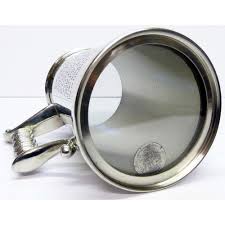
PUNCH
Derived from the Marathi (Indian) word for five, which was the number of ingredients in the concoction – sugar, lime-juice, spice, water and Arrak, the local Indian spirit.
RIFF-RAFF
Term derived from the rather unsavoury Riff and Berber pirates from the Barbary Coast of North Africa.
ROOM TO SWING A CAT
Taken from the punishment by CAT O’ NINE TAILS there needed to be sufficient room to swing the Cat to meter out the punishment. Now used to describe a room by saying, ‘there isn’t enough room to swing a cat in here!’
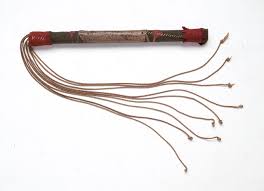
SAILING CLOSE TO THE WIND
A term meaning ‘too get as much out of a situation as possible’. A skilled task for a helmsman to sail ‘close to the wind’, thus clawing the ship to windward as much as possible without lifting the sail (sailing too close), which would drop the ship’s speed and increase leeway.
SCRAN
A term for food in the Royal Navy derived from the practice of supplementing sailors’ diets with additional portions of Sultanas, Currants, Raisins and Nuts – which can be shortened to ‘SCRAN’. This was a technique of reducing scurvy and ensuring sailors diets were of good quality.
SCUPPERED HIS CHANCES
The drainage channels on the side of ships of old were called the ‘scuppers’. The expression is used to describe someone who has lost his chances down the scuppers.
SHOW A LEG!
Traditional exhortation to wake the crew up; derived from the old days of sail, when women were allowed on board and to stay overnight while in harbour. The females could also linger an extra hour in the hammocks, providing they could prove their gender by showing a (hairless) leg to the Boson’s Mates as they did their rounds.
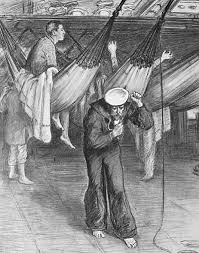
SLING YOUR HOOK
‘Hook’ being Naval slang for ‘anchor’, or an expression telling someone to leave harbour or go away. An expression that has come ashore and is often used derisively against someone.
SLUSH FUND
It was customary on Royal Naval war vessels to sell ‘slush’ and other refuse to create a fund for the benefit of the enlisted men. Slush was the term given to the fat that rose to the surface of meat being boiled. It was often spread on ships biscuits to make them more palatable, and purchased from the chef using a ‘slush fund’
SNOTTY
Older word for Midshipman. These young men used to have three buttons sewn onto their jacket cuffs to stop them wiping their noses on the sleeves. Their uniforms were designed without pockets so that there would be no temptation to stand around idling, but there was also nowhere to stow a handkerchief, hence the buttons.
SON OF A GUN
Debauchery on the Gun decks in older times was a common feature of life in harbour after a long stint at sea. With women on board in this way, there were even babies born be’tween decks; a male child, born on the gun deck and father often unknown, became the ‘son of a gun’.
SOUNDING OUT
Soundings are the depth of water. Thus sounding out was to chart the depth of water to ensure that the vessel could float. An expression that has come ashore to ‘sound someone out’ is to see what his or her reaction would be to a proposal.
SQUARED AWAY or SQUARED UP
At harbour stations; the yards (horizontal beams to which the sails were attached), would be ‘squared away’, that is placed in fore and aft laying positions. This would signal the end of a voyage when the crew then got paid.
SWINGING THE LEAD
A lead man swings a rope weighted by a lead sinker, and lets it drop into the water to measure the distance to the seabed. This is an skilled task, but a very tiring one. The lead men were known to pretend to swing the lines, and then call out false sounding of the depth, hence saving himself the work of lifting and throwing the heavy line. Hence, the popular expression for someone not doing all they should.
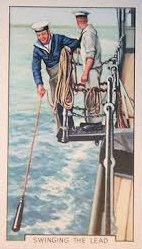
TAKE A POUNDING
As the Ships bows hit the waves in a high sea, they ‘pound’ their way into it. A phrase that has come ashore, and means ‘having a hard time’.
TAKEN ABACK
When the old square riggers tacked through the wind if they lost momentum and steerage before completing the tack, the wind would fill the sails from the front, thus pushing the Ship backwards. Hence, the popular expression to be ‘taken aback’
TARRED WITH THE SAME BRUSH
Makassar oil was used to ‘tar’ a sailors pigtail of hair (Hence Jack Tar). Being tarred with the brush meant two sailors were obviously ship mates, and came from the same background. Now used as an expression to describe individuals who have similar attitudes and ideals. Jack tar had a distinctive apron draped over his shoulders to protect his uniform from the tar. Antimacassar’s are well used on the backs of chairs too.
THREE SHEETS TO THE WIND
Old description of a sail that is almost out of control because its sheets – or control ropes – are flapping in the wind. Now used to describe someone who is drunk.
TIDE OVER
Ships beating down the English Channel against the prevailing winds could not make headway against a flood tide; instead they would drop anchor until the tide began to ebb, thus ‘tiding over’ the temporary difficulty.
TO LOSE ONES’ BEARINGS
Bearings were taken using land objects to get a navigational fix of a ships position. To lose ones’ bearings inferred that one was lost.
TO TAKE ON BOARD
A popular expression, self-explanatory and meaning literally to take provisions or other items on-board.
TOOK THE WIND OUT OF HIS SAILS
A windward vessel steals the wind from another to leeward. Now used for someone who is rather taken aback.
TOUCH AND GO
Derived from the action of navigating a ship through shallow waters. Progress would be made until the keel ‘touched’ where upon the ship would come about, and move on (‘go’). Hence the things are a bit touch and go.
TRIM AND PROPER
Expression derived from a neat ship, which was all squared away, meaning tidy.
TRUE COLOURS
False colours (flags) were permitted during an approach to another ship, but the True colours had to be broken out once battle was joined and gun fire exchanged.
TRY A DIFFERENT TACK
A ship moves to windward in a series of zigzag movements. Each zigzag is called a tack, thus ‘trying a different tack’ is to see if one can get to ones’ destination on the other tack much quicker.
TURN A BLIND EYE
Derived from Lord Nelson’s conduct at the Battle of Copenhagen, where he chose not to see a signal ordering him to break off the action, and went on to destroy the Danish fleet. Hence the expression ‘I see no ship’s’.
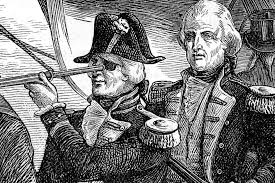
WHEN MY SHIP COMES IN
Used by the merchants as a phrase meaning they would get the revenue from the ships cargo. much food as the plate would carry, and hence the expression to have a ‘square meal’ which we know as a meal that is substantial in quantity.